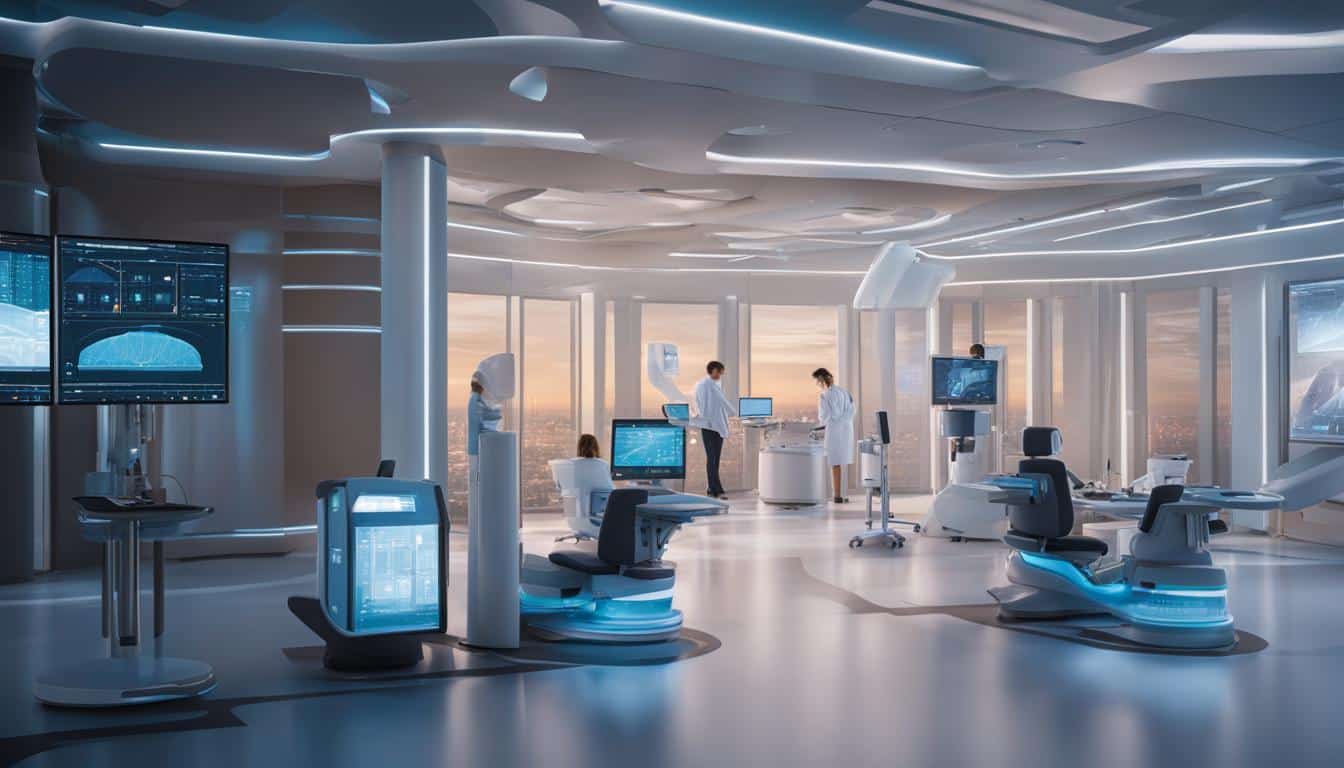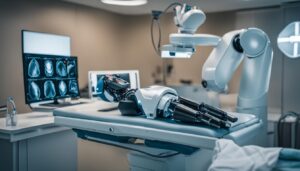
In this article, I will explore the use of AI in health informatics solutions, which are transforming the analysis of medical data and providing actionable insights to improve patient care and outcomes. The integration of AI into healthcare systems has the potential to revolutionize the way we understand and leverage medical data.
Medical data is abundant and complex, containing valuable information that can unlock new insights and drive advancements in patient care. However, the sheer volume and complexity of this data make it challenging for healthcare professionals to extract meaningful insights efficiently.
AI algorithms, powered by machine learning and deep learning techniques, can analyze vast amounts of medical data with precision and speed, uncovering patterns and relationships that might go unnoticed by humans alone. These algorithms can process diverse types of data, including electronic health records, medical images, genomic data, and sensor data, to name a few.
The applications of AI in health informatics are far-reaching. It can aid in diagnosing diseases more accurately, predicting treatment outcomes, personalizing treatment plans, and even assisting in surgical procedures. By augmenting the capabilities of healthcare professionals, AI can enhance patient care, improve treatment effectiveness, and ultimately save lives.
As we continue to advance in the field of AI in health informatics, it is crucial to address challenges such as data privacy and security, algorithm reliability, and ethical considerations. Rigorous regulation and ethical frameworks must be in place to ensure responsible and beneficial utilization of AI technologies in healthcare settings.
In the following sections, I will delve deeper into the specific domains of AI in health informatics and examine the challenges, applications, and future prospects of this exciting field.
Key Takeaways:
- AI in health informatics is transforming the analysis of medical data and providing actionable insights to improve patient care and outcomes.
- AI algorithms can process diverse types of data, including electronic health records, medical images, genomic data, and sensor data, to uncover patterns and relationships.
- Applications of AI in health informatics include more accurate disease diagnosis, predicting treatment outcomes, personalizing treatment plans, and assisting in surgical procedures.
- Challenges such as data privacy, algorithm reliability, and ethical considerations must be addressed to ensure responsible AI utilization in healthcare.
- The future of AI in health informatics holds immense potential for improving healthcare delivery and enhancing patient outcomes.
Extracting Information from Images in Health Informatics
One of the primary challenges in health informatics is extracting valuable information from images. While our human brains excel at this task effortlessly, automated algorithms have long struggled to replicate our abilities.
Computer vision, the domain of AI that focuses on processing and understanding visual data, faces a fundamental challenge in extracting relevant information from images. Automated algorithms rely on intricate patterns of pixels, but they do not possess the innate human-like understanding of context and visual cues that our brains effortlessly employ.
The Human Brain vs. Automated Algorithms
“The human brain possesses an incredible capacity for interpreting images, recognizing objects, and discerning patterns. Our brains effortlessly extract valuable information from visual inputs, enabling us to perceive and understand the world around us.” – Dr. Jane Thompson, Neuroscientist
Automated algorithms, on the other hand, require training on massive datasets and sophisticated computer vision techniques to attempt to replicate human visual perception. While these algorithms have made significant advancements in recent years, they still lag behind the remarkable capabilities of the human brain.
Despite these challenges, researchers and scientists continue to make strides in the field of computer vision. The development of deep learning algorithms and the utilization of neural networks have significantly improved the ability to extract information from images.
This image demonstrates the complexity of extracting information from medical images. The visual data contains intricate details that require sophisticated algorithms to decipher, mimicking the human brain’s ability to analyze and interpret such information.
The Potential of AI in Bridging the Gap
While the gap between automated algorithms and human-like understanding remains, AI holds immense potential to bridge this divide. By leveraging computer vision and implementing advanced algorithms, we can continue to improve the extraction of meaningful information from medical images.
This progress in computer vision has far-reaching implications for health informatics. It enables more accurate diagnoses, aids in treatment planning, and supports medical research by analyzing vast amounts of visual data efficiently and effectively.
As the field of AI progresses, we can look forward to continued advancements that bring us closer to unlocking the full potential of computer vision in health informatics.
Applications of AI in Health Informatics
The field of health informatics presents a wide range of applications for artificial intelligence (AI) technology. From automatic assistance to robotic learning, AI is revolutionizing the healthcare landscape. In this section, we will explore the various roles AI plays in health informatics, leveraging its capabilities to enhance patient care and outcomes.
Automatic Assistance
AI has the potential to provide automatic assistance, guiding individuals in complex tasks and offering real-time instructions. Through intelligent algorithms and machine learning, AI systems can analyze vast amounts of medical data and provide healthcare professionals with valuable insights and recommendations for diagnosis, treatment, and patient management. This automatic assistance not only improves the efficiency and accuracy of medical decision-making but also reduces the burden on healthcare providers.
Robotic Learning
Another exciting application of AI in health informatics is robotic learning. By enabling robots to learn from humans through demonstrations, AI technology opens up new possibilities for medical robotics. Robots can observe and replicate human movements and actions, allowing them to assist in surgical procedures, rehabilitation exercises, and other healthcare tasks. Robotic learning has the potential to enhance precision, safety, and efficiency in medical interventions, ultimately benefiting patient care.
Advancements in Autonomous Driving
AI has played a significant role in the development of autonomous driving, and its impact on health informatics is no exception. In the context of healthcare, autonomous driving technology can facilitate the transportation and delivery of medical supplies, medications, and even organs for transplantation. By leveraging AI algorithms and robotic systems, healthcare providers can ensure timely and secure delivery, enhancing patient care and improving overall logistics efficiency.
Visual Language Representations
Visual language representations are another area where AI is making strides in health informatics. By leveraging computer vision techniques and natural language processing, AI systems can analyze and interpret visual information such as medical images, charts, and diagrams. This ability to extract meaningful insights from visual data enables healthcare professionals to make more accurate diagnoses, develop personalized treatment plans, and monitor patient progress effectively.
Role of Instructional Videos
Instructional videos are emerging as a valuable source of data for training AI models in health informatics. These videos provide dynamic and interactive demonstrations of medical procedures, enabling AI systems to learn from real-world scenarios. By analyzing instructional videos, AI algorithms can gain insights into complex medical techniques and improve their capabilities in assisting healthcare professionals. Ultimately, this enhances the quality of patient care and contributes to continuous advancements in health informatics.
To summarize, the applications of AI in health informatics are diverse and impactful. From providing automatic assistance and facilitating robotic learning to enabling advancements in autonomous driving and leveraging visual language representations, AI technology is revolutionizing healthcare. Furthermore, instructional videos serve as an invaluable resource for training AI models and enhancing their performance. The combination of these applications has the potential to significantly improve patient care and outcomes in the field of health informatics.

Challenges and Future Outlook in AI Health Informatics
While AI has made significant advancements in the field of health informatics, there are still challenges that need to be addressed. Developing automated algorithms capable of accurately analyzing medical data poses a significant challenge. The complexity and variability of healthcare data make it difficult for machines to extract meaningful insights consistently.
Machine learning plays a crucial role in addressing these challenges. By leveraging algorithms that can learn from data and adapt over time, AI systems can enhance their ability to analyze medical information and make accurate predictions. The integration of machine learning algorithms in health informatics has the potential to revolutionize healthcare delivery by providing real-time insights and personalized recommendations.
“The power of AI in health informatics lies in its ability to process huge volumes of data and identify patterns that may not be immediately apparent to human experts.”
The performance evaluation of AI models in health informatics is another important aspect to consider. Robust performance evaluation and comparison metrics are needed to assess the effectiveness of AI algorithms accurately. This ensures that the deployed models are reliable and can provide accurate results that can be trusted by healthcare professionals.
“Performance evaluation is essential to ensure that AI models in health informatics meet the required standards of accuracy and reliability.”
Looking towards the future, the outlook for AI in health informatics is promising. Collaboration with European networks can lead to the exchange of knowledge and expertise, fostering innovation and advancements in the field. Additionally, the application of AI in complex systems, such as genomic medicine and population health management, holds immense potential in improving healthcare outcomes and reducing costs.
“The future of AI in health informatics is characterized by ongoing advancements, collaboration, and the exploration of new frontiers to optimize patient care and outcomes.”

Challenges in Developing Automated Algorithms
The development of automated algorithms capable of accurately analyzing medical data is a significant challenge in health informatics. The complexity of healthcare data, including various data types, formats, and sources, presents challenges in standardization and interoperability.
Furthermore, medical data often involves high-dimensional and unstructured data, making it difficult to extract relevant information automatically. Additionally, ensuring the privacy and security of sensitive patient information is a crucial consideration in the development of AI algorithms.
Importance of Machine Learning in Addressing Challenges
Machine learning plays a pivotal role in addressing the challenges faced in health informatics. By utilizing algorithms that can learn from data and adapt over time, machine learning enables AI systems to analyze medical information more accurately and efficiently.
Machine learning techniques, such as deep learning and natural language processing, have shown promising results in improving the performance of AI algorithms in health informatics. These techniques enable the identification of complex patterns and relationships within medical data, leading to more accurate diagnoses, treatment recommendations, and outcome predictions.
| Challenges | Importance |
|---|---|
| Developing automated algorithms | Addressing the complexity and variability of healthcare data |
| Performance evaluation | Assessing the accuracy and reliability of AI models |
| Collaboration with European networks | Fostering innovation and knowledge exchange |
| Application in complex systems | Optimizing patient care and reducing costs |
Impact of AI in Health Informatics on Patient Care and Outcomes
The integration of AI in health informatics has the potential to revolutionize patient care and improve outcomes. AI technologies are designed to assist healthcare professionals in various aspects, enhancing diagnosis accuracy, enabling personalized treatment plans, and predicting patient outcomes through advanced analytics. By leveraging the power of AI, healthcare providers can make more informed decisions and provide better care to patients.
Improved Diagnosis Accuracy
AI algorithms have shown great promise in improving the accuracy and efficiency of disease diagnosis. By analyzing vast amounts of patient data and medical records, AI systems can identify patterns and anomalies that might go unnoticed to the human eye. This enables healthcare professionals to make more accurate and timely diagnoses, leading to better treatment outcomes.
Personalized Treatment Plans
Every patient is unique, and their healthcare needs should be treated as such. AI in health informatics allows for the development of personalized treatment plans tailored to individual patients. By analyzing patient data, such as medical history, genetics, and lifestyle factors, AI systems can provide recommendations and guidelines that take into account the specific needs and characteristics of each patient. This personalized approach can lead to more effective treatments and improved patient outcomes.
Predictive Analytics
Predictive analytics is an area where AI excels in health informatics. By analyzing large datasets and applying machine learning algorithms, AI systems can predict patient outcomes and identify individuals who are at risk of developing certain conditions. This allows healthcare providers to take proactive measures to prevent the progression of diseases, leading to better overall patient care and outcomes.
Furthermore, AI in health informatics has already made significant impacts in various real-world applications. For example, AI has been used in protein engineering to expedite the discovery of new drugs and therapies. By simulating molecular interactions, AI models can predict the effectiveness and safety of potential drug candidates, leading to faster development and improved treatment options. Additionally, AI-powered molecular dynamic simulation techniques have been used to study the behavior of molecules and understand their impact on disease progression, opening up new avenues for targeted interventions.
By harnessing the power of AI, healthcare professionals can enhance patient care, improve diagnosis accuracy, develop personalized treatment plans, and predict patient outcomes. The potential for AI in health informatics is vast, and as technologies continue to evolve, we can expect further advancements that will transform the future of healthcare.
| Benefit | Description |
|---|---|
| Improved Diagnosis Accuracy | AI algorithms can analyze large datasets and detect subtle patterns or anomalies that may be missed by human observers, leading to more accurate and timely diagnoses. |
| Personalized Treatment Plans | AI systems can analyze patient data and provide tailored recommendations for treatments, taking into account individual characteristics, such as genetics and lifestyle factors. |
| Predictive Analytics | AI models can predict patient outcomes and identify individuals at risk of developing specific conditions, enabling proactive interventions and preventive measures. |
Conclusion
In conclusion, the integration of AI in health informatics solutions is revolutionizing the analysis of medical data and providing valuable data insights for enhancing patient care and improving outcomes. By leveraging the power of AI, healthcare professionals can make more informed decisions and deliver personalized treatment plans.
We have explored the wide range of applications for AI in health informatics, from automatic assistance and robotic learning to visual language representations and instructional videos. These advancements in AI technology have the potential to transform healthcare delivery, allowing for more efficient and accurate diagnoses, as well as predictive analytics for better patient outcomes.
Looking forward, the future prospects of AI in health informatics are promising. As AI continues to advance, we can expect even greater improvements in personalized medicine, disease diagnosis, and treatment planning. By collaborating with European networks and investing in complex systems, we can unlock the immense potential of AI in revolutionizing healthcare delivery.
FAQ
What is the role of AI in health informatics?
AI in health informatics is transforming the analysis of medical data, providing actionable insights to improve patient care and outcomes.
What are the challenges in extracting information from images?
Automated algorithms face challenges in replicating human abilities in extracting valuable information from images in health informatics.
What are the applications of AI in health informatics?
AI can provide automatic assistance, enable robotic learning, contribute to advancements in autonomous driving, and utilize visual language representations.
What challenges does AI in health informatics face?
Challenges include developing accurate automated algorithms, the importance of machine learning, and the need for robust performance evaluation.
How does AI impact patient care and outcomes in health informatics?
AI improves diagnosis accuracy, enables personalized treatment plans, and predicts patient outcomes through advanced analytics.
What is the future outlook for AI in health informatics?
The future holds immense potential for collaborations, such as with European networks, and the application of AI in complex healthcare systems.
Source Links
- https://www.toolify.ai/ai-news/revolutionizing-machine-perception-insights-from-ai-symposium-474091
- https://www.mdpi.com/2813-3323/2/1/1
- https://www.mdpi.com/2226-4310/11/1/64








